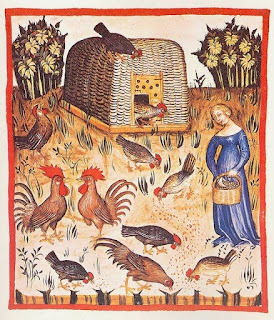Our black suitcase is so very common, so average, on Thursday afternoon it faded right into invisibility.
From the Large Luggage rack on Coach Number 2 of the Madrid-Ponferrada Regional Express train, our black wheelie-bag joined the realm of mystery.
Paddy had the bag with him on that train. He was on his way home from a quietly extraordinary two-day getaway in the big city. There we stayed in a ridiculous hotel designed for robots, feasted on Brazilian Swords O Meat, saw a retrospective of Catalan artist Ramon Casas i Carbo, and most importantly, we consulted with one of Spain's top retina specialists.
The eye doc said the treatment Pad's getting now at Palencia's public health hospital is top-class. And she gave him one thing the locals have not: a prescription for new glasses. Glasses she says will improve his distance vision "markedly, 30 percent," and his up-close vision "noticeably, maybe 10 percent."
Which, when you're expecting to be told you'll be blind in a couple of years, is worth celebrating.
We spent the rest of that day sitting at a cafe table along a busy sidewalk, watching the people go by, laughing and relaxing. We have an appointment in Palencia on Monday. We can have the optician there make up the glasses, handy dandy!
The following morning I headed off to Santiago de Compostela on a 28 Euro airplane flight. At that price, you do not check any bags. I put my Compostela gear in my little backpack, and put my Madrid clothes with Paddy's, in the black four-wheel-drive suitcase. He took it home with him on the fast afternoon train.
The train stops in Segovia, and again in Valladolid. The next stop is Palencia, where Paddy got off. But when Paddy went to get his suitcase, it wasn't on the rack.
There was an average black bag there, but it had a ribbon around the handle, and two wheels. It was not our bag. But it was near enough to be mistaken for it.
Our black suitcase had vanished.
The train was ready to leave. Paddy jumped off, and like a sensible citizen went directly to the station manager. In the 40 minutes he had before his connecting train headed for Sahagun, he filled in the papers, told three different people he thought it was just a mistake, that some poor boob in Segovia was at home now, saying bad words, rifling our dirty laundry.
He might be pleased to find our new IPad. I'd put the new computer in there, seeing as we couldn't figure out how to make it recognize a wifi signal. My new jeans were in there, too, and my favorite old black silk kimono jacket. And my first and only hand-made shoes I bought in Italy. (I don't have a lot of clothes, and I detest shopping. This was a blow.)
But Paddy was shockingly sanguine.
"It's a suitcase. Clothes. Stuff," he said on the telephone. "It will turn up. I'm not going to get all upset about it."
"It's the prescription," I said. "The whole reason we went to Madrid!"
"If the bag doesn't show up, we'll call up the doctor and have her re-send it," he said, blithely.
No one from the railroad phoned that night, nor the day after.
Kim arrived at Peaceable, expecting to find me there. (People never arrive when I am home. When I want wonderful visitors at my house, all I have to do is leave.) Kim heard the sad tale of lost luggage. Kim is a Mac expert. She sent a "ping" to the IPad inside our suitcase, to see where it was in the world. If it had been stolen, she could frustrate the thief with a remote-control "kill switch" that would render the little machine useless forever.
But I'd shut the IPad down before I packed it away. Somewhere out there it slumbered on, unmolested, un-pinged.
I came home this afternoon on the train from Santiago. We phoned up the railway for news.
Our ordinary black suitcase was found, an ornery man said, in Ponferrada, not Valladolid, nor Segovia. It was way over 150 kilometers west of here, at the end of the train's trajectory. Yes, they had not bothered to tell us. And no, they would not put it on the next train east, so we could pick it up in Sahagun. If we wanted the suitcase, we'd have to shlep to Ponferrada and get it.
We wondered. How the heck did our suitcase get to Ponferrada? Was that our bag, or the lookalike with the ribbon and two wheels? The stationmaster wouldn't say. Should we go all the way over there for what might be someone else's bagful of laundry?
And it's Saturday. Would the station still be open by the time we got there? Everything closes on Sunday. And on Monday we have to be in Palencia! Ay yi yi!
And up stepped Kim.
"I have a license. I had a full night's sleep. I love driving. Give me Paddy's ID and his train ticket and I'll go over in the car."
I should've gone with her, but I'd just spent six hours on a train. (A train that had stopped in Ponferrada!)
Maybe Paddy should've gone with her, but why?
And so she went. I wrote a sort of permission slip, claiming Kim was our daughter, telling the railway to let her have our bag. I handed her some gas money and the keys, and she drove off into the sunset. A couple of hours later she sent me the photo above, taken on the platform in Ponfi.
Aside from being a Mac Pro, Kim's a photographer, and a filmmaker.
And a Soulful Mystic Pilgrim.
She's our Hero of the Day.
She's the best friend you could ever ask for.
She is extraordinary, even in the most ordinary ways.



